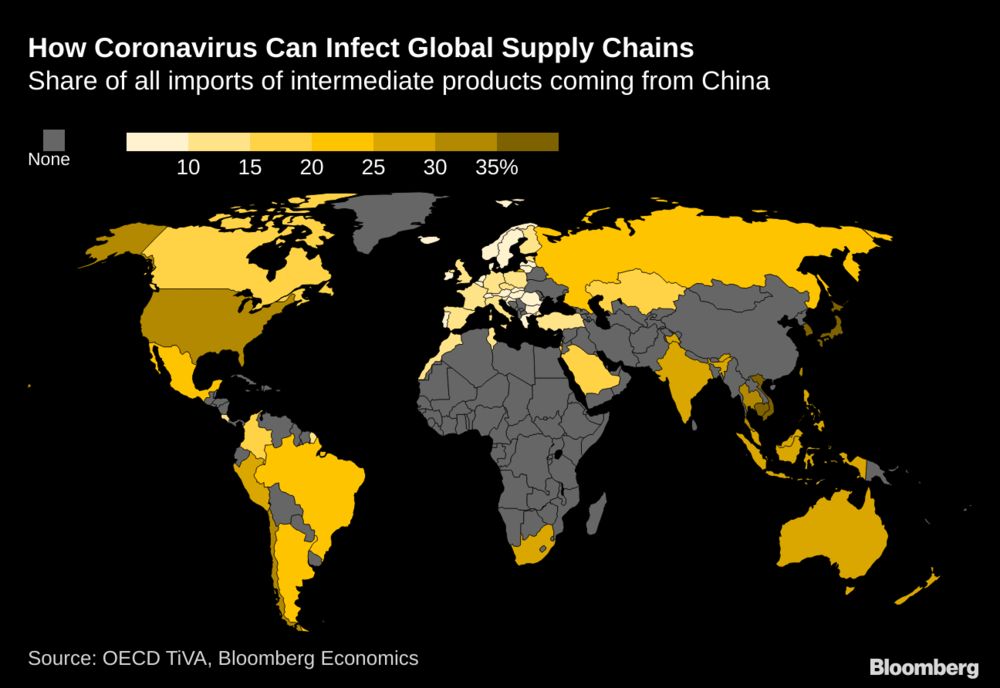The novel coronavirus will challenge humans, society, healthcare systems, governments and economies. We can hope that the outbreak is mitigated as summer approaches and people and countries recover swiftly. Whilst its challenge remains, the coronavirus will alter how employees and businesses work, manufacturing and distribution will slow, product supply chains will suffer, and companies must adjust.
Harvard Business Review, at the end of February, predicted that the impact of the coronavirus on supply chains would peak during mid-March. Not only will companies outside of China slow their production and distribution but the activity stall in China whilst it coped with the outbreak will be felt as exports from China fall drastically.
Suddenly each and every shipment of goods around the world, especially foodstuffs, medicines and products for the healthcare sector is more important than ever before. With self-isolation and self-quarantine becoming prevalent in many countries there will be less employees at the frontline of logistics management.
Sadly, already masks and sanitizers have been stolen from hospitals who cannot now be short of any critical equipment. We’d hope this terrible behaviour doesn’t continue, but it may. There have also been reports of simple non-prescription medicine shortages.
The world is becoming an uncertain place. Businesses and organizations are concerned, they must manage every asset, every shipment and every penny closely.
More broadly, technology will play a significant part in managing and mitigate the coronavirus outbreak and its wider effects overall. On March 11th UK Prime Minister Boris Johnson met with the country’s largest technology companies in what has been called a “digital Dunkirk.” Johnson urged the attendees, around 30 technology, AI and science companies, to provide relevant resources. Palantir committed its engineering staff, Uber is promising rides for medical staff, Deliveroo will feed hospital workers, Amazon will contribute its cloud services to the healthcare sector. These contributions from technology giants will help. Smaller technology businesses may not be able to volunteer resources, but they do have cutting-edge products and services available to other businesses of all sizes that could help them survive the crisis and continue to deliver vital resources and services.
More specifically, real time tracking devices can help to add a little more certainty to supply chains and operations. WiFi and assisted GPS positioning tracking devices are small and relatively inexpensive, but they can give an almost constant position report to any company or buyer. A vital shipment of parts, pharmaceuticals or even foodstuffs can be tracked completely and located quickly if lost. Alerts can be initiated the second a device deviates from an expected route. This technology removes the need for calls or emails to busy employees to check the status or location of a shipment, the location can be there in real-time, on a screen or within an app.
As people must adopt social distancing, supply chains need to be fluid, seamless and effective. Realtime tracking devices can secure any shipment large or small, help to prevent theft and accidental loss, and they reassure both shipper and receiver.
In fact, it’s not just businesses and organisations that can benefit from the utilisation of tracking devices. Consumers, unable or unwilling to travel to transport belongings, care packages or gifts can take advantage of tracking devices smaller than a phone that help to ensure a package reaches its recipient in a safe and timely manner. Tracking devices can also be given to humans, large or small, letting loved ones monitor their location and alerting to any anomalies that might indicate they are in trouble.
It’s incredible that the technology giants of today’s digital age are able and willing to volunteer resources. Digital devices, platforms and services have been steadily working towards their promise of greater efficiencies. This year will see technology step up to support governments, economies, public and private services as we all work hard to overcome the challenge of the coronavirus.
